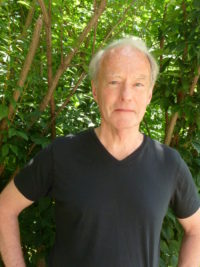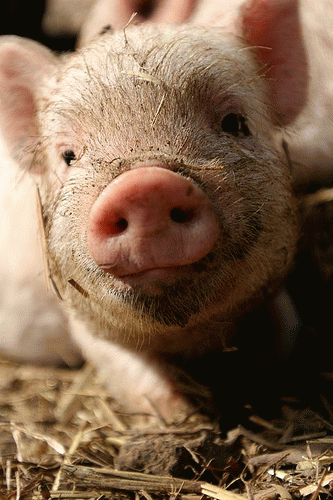By Edward Curtin
Extensive scientific research has concluded that pigs that stink and grow larger as they age have small eyes and tend to stare at people. Researchers across the world have replicated and confirmed 37 times the findings of the original research done in 1953 in Kansas by Dr. Wilfred Jeffred Eftie. While seemingly insignificant on the face of it, these replicated studies in abnormal zoology have led to new insights into our epistemological understanding of the place of egoism in political life. The epidemiology of egoism has long perplexed scientists, but Eftie's brilliant counterintuitive insights have led to some major breakthroughs. However, the story of Eftie's original discovery, ignored for years, deserves renewed attention. But I will get to that in due course.
Let's first take a look at a few of the significant follow-up studies that have added so much to our understanding of animal and human behavior. It's surely an understatement to say that in the world of science we stand on the shoulders of giants such as Eftie. One study that was repeated 193 times found that small eyes in humans tended to result in marked elevations of dopamine and diminished activity in the frontal cortex, the same results that were found in pigs. When translated into the political arena, researchers found that politicians with small eyes tend to stare at people as a power tactic, and such body language is correlated with a tendency for them to grow larger as they age -- i.e. get fat. Their small-eyed stares seem to intensify the power differential between them and those stared at, but this was not conclusively proven.
Unlike the pig studies from which this research emanated, no correlation was found to body odor. However, one eminent New York City based researcher, Dr. M.J. Shoat, found that smell is very subjective, and therefore in the human samples an intervening variable, such as deodorant, may be a factor. Shoat did find a possible link that demands further study: In the politicians and celebrities that comprised her sample - seemingly different from the original pigs -- there was a significant probability that the sulfuric whiff they gave off, came from their mouths when they talked, unlike the small-eyed fat pigs that stank all over.
In one of his follow-up studies, Dr. Eftie put it this way: "Without resorting to value judgements, it is the intent of this research project to substantiate an empirical relationship between the small size of the medium swine eye (as intensified through the pig smell/eyelid blink factor) on the one hand, and resulting intrafamily behavioral oddness on the other.... Animals in the control group progressed, without exception, from small to large size as they matured, thus creating the impression that they could both see more and take increasingly decisive action in response to visual stimuli."
An ingenious researcher, Dr. Edward Edwards, an ethno-methodologist, took the small-eyed pig studies and applied their methodology to self-promotion among well-known people. He reviewed thirty-five books they had written, including autobiographies and political memoirs, and concluded that those with the smallest eyes (based on optical scans of book jacket photos) tended to have the largest egos. While his sample size was admittedly small, so were their eyes, and he thought intensity of gaze was more important than size. He reported that in a eureka moment he realized that they all seemed to be looking intensely at him. What his subjects had in common -- aside from money and having been mentioned in the gossip columns -- was that they considered themselves to be Somebodies (his term). As a good researcher does, he operationalized the term "Somebody" to mean "not Nobody." What else, if anything, a Somebody is he left hanging until his follow-up study when he plans to interview the thirty-five and ask them. He expects they will gladly answer.
One of the most intriguing aspects of all this ground-breaking research is how it sheds light on the need to replicate studies. Repetition, repetition, repetition -- that's the key -- a sine qua non of the scientific method.
Sadly, the first pigs observed by Dr. Eftie are long deceased. They stare no more. Absurd as it may sound, we owe them a great debt. Since a pig's life is a brief prologue to bacon, most researchers have had to study the children and grandchildren of Eftie's pigs. But their offspring have flourished -- thank God for that. Pigs seem to reproduce rapidly and in great numbers, and researchers today have a wide assortment to choose from, across species.
In conclusion, let me say that modern scientific research and the mass media that present us with their amazing findings, both flourish through repetition. Keep hammering the same point; that way truth will emerge. People need to hear things repeated before it sinks in. Not just the research into political pigs with small eyes and big egos, but what they say, and what we say about what they say, and what the media repeats about what they think about what they say. We are marching toward the light; that's for certain. But it takes perseverance. If we stick to our guns, remain humble, and keep repeating ourselves, this writer believes we will perhaps discover that even pigs with large eyes stare at people.
After all, Dr. Eftie's dazzling insights had humble beginnings, but he kept after it. The roots of his genius lie in his childhood, as his first observational study makes clear. He was a brilliant and precocious child. When he was seven years old and just starting the second grade, his teacher, Mrs. Schmidt, had the brilliant idea of having her students write about what they did on their summer vacation. Wilfred's scholarly career began with that essay. Here it is:
"Wilfred E 2A My Sumer Vacation
I
spent too to weeks all sumer at my Granpa Efties on a farm in Conzu
Canz Canzus. i saw many pigs their. Sum of the pigs saw me too two.
With there tiny eeis eyes. The Big pigs were very big."
*Dr. Eftie's lifetime work, including "My Sumer Vacation," is comprehensively presented by Tom Koch in the April 1973 issue of Mad magazine, perhaps this country's finest research journal.
(Article changed on June 15, 2016 at 15:55)






